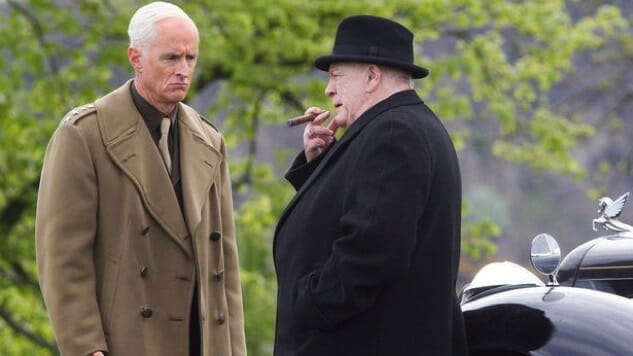Introducing Endless Mode: A New Games & Anime Site from Paste
It’s difficult to think of a biopic that so thoroughly embarrasses its subject in the process of attempting to honor them the way Churchill does. This portrait of Winston Churchill makes the revered British prime minister look like an utter doddering fool, in sharp contrast to his popular image as a sharp bulldog of a man. If this were a stealth parody of biopics and a secret takedown of the title character, it’d be an instant subversive classic, and one of the best comedies of the year. But such a reading would require overlooking the painfully self-serious sincerity which runs through the entire film.
The movie follows Churchill (played by Brian Cox) over the several days leading up to the D-Day invasion in June 1944. World War II has dragged on for years and is now hitting its climax on the European front, and Churchill is not entirely sure of the viability of the Allies’ plan, no matter what American General Eisenhower (John Slattery) says. He can’t forget the carnage of the wars he fought in, and in fear for what his soldiers are about to face, he first attempts to abort the invasion, and then to join it. Once both actions are thwarted, he spends much of the movie aimlessly moping. All this takes around a hundred minutes. It’s even duller to watch than it reads.
Churchill has shown up a lot in film and television—this isn’t even the only movie about him coming out this year. Yet despite the variety of appearances he’s made, there’s a curious sameness to many of the portrayals. Actors playing Churchill seem unusually tempted toward pantomiming caricature, even more than we’re already used to seeing in biopics. They tend to display the same squint, hunch, pursed lips and grumbling voice. Cox’s performance is no different in this regard. He’s not playing a character; he’s trying to be a Disneyland animatronic.
There is one deviation from the Churchill norm, and it’s what Churchill is counting on to distinguish itself. This is a Churchill full of doubts and anxieties, a peek behind the stiff upper lip he presented to his country. There’s truth to this—all the broad strokes of the story are historically accurate, including Churchill’s “Black Dog” moods and his wanting to personally oversee D-Day at one point. Yet the movie does not illuminate its subject in presenting that truth. Stripping away the popular conceptions of history is a valuable effort, but all this film does is play the same emotional note for its protagonist. Adding just one extra level to our historical knowledge is hardly nuanced exploration.
Worse is how the low stakes of the story (which are not centered around D-Day itself, but simply how Churchill feels about it) mean that all the overwrought drama becomes unintentionally funny. The fact that Churchill is completely wrong about the potential failure of the invasion drains all suspense from the debates around it, and his brief fixation on joining the fray personally makes him look like a confounding idiot. But in the end, Churchill mostly exists to reaffirm the existing image of the man, humanizing him only in the service of making him seem all the more extraordinary. (“Wow, think of how well he projected bravery in spite of his doubts!”) This is pointless as history and useless as entertainment.
Director: Jonathan Teplitzky
Writer: Alex von Tunzelmann
Starring: Brian Cox, Miranda Richardson, John Slattery, James Purefoy
Release Date: June 2, 2017
